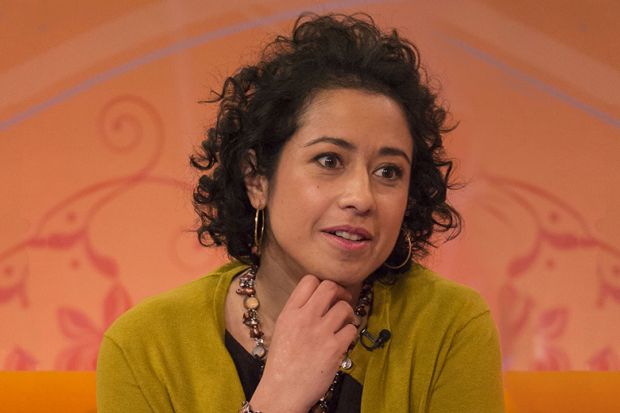Samira Ahmed is an award-winning journalist, writer and broadcaster. She presents BBC Radio 4’s Front Row, Newswatch on BBC One and The Proms on BBC Four, as well as writing documentaries for TV and radio. In June, she was made an honorary fellow of St Edmund Hall, Oxford, where she read English as an undergraduate student.
Where and when were you born?
Queen Mary’s Hospital, Roehampton, 1968. I don’t remember Swinging London, but I was there.
How has this shaped you?
I grew up on the fringes of south London. It’s always given me a good, safe place to come home to and get distance from and perspective on the centres of power.
How does it feel to be recognised by your old college in becoming an honorary fellow?
I didn’t think anything could make me feel as excited as when I won my place at Oxford or got my first job at the BBC. [But] this opens up a whole new lease of life. It’s a huge honour to be recognised for my journalism.
How do you plan to use the new title?
Go and give talks, possibly do something with the comedian Stewart Lee, who was my tutorial partner and already an honorary fellow. I am thinking about a book idea to research in the university libraries. I regularly lunch with a couple of broadcaster friends who are academics. I feel I’m only a partial impostor now.
What kind of undergraduate were you?
Not as good as I wish I had been. I did try everything I wanted to try, and throwing myself into student journalism was so valuable. But having worked so hard at school, I lost my discipline and didn’t push myself as much as I should have. I think I could have enjoyed all the new experiences but worked harder.
Do you think Oxford has changed since you graduated? Does it need to?
There’s such a difference between the image and the individual experience. I never doubted for a second that I was treated with scrupulous fairness and equality by my tutors at Oxford. I got huge support. It made it all the more shocking that the world of journalism has proved to be so endemically and enduringly discriminatory. At the same time, I look back amazed at how so many colleges’ drunken rugger-bugger culture was tolerated for so long. Student-wise, I think Teddy Hall has had a richer mix than many other colleges for years. When I’ve gone back, it’s struck me how diverse it is.
What advice would you give your younger self?
Demand equal pay. Everywhere. Every single time. Don’t think being the best and being patiently polite will ever get you what you deserve.
Have you ever had a eureka moment?
I was reporting on A-level results at Channel 4 News about 15 years ago and girls yet again were said to be widening the attainment gap, when I finally realised that [their progress] was never translating into advantage in the workplace. I realised that the exam system wrongly teaches young women to assume that they’ll be rewarded fairly on merit in the workplace. Young women do not need fixing. Employers do.
What keeps you awake at night?
Not much. About six years ago, I stopped being afraid.
What do you do for fun?
There is no greater pleasure than a book and a nice coffee. But I also love going to the Southbank to see old pictures at the British Film Institute or plays at the National Theatre. I like swimming in outdoor pools.
What’s your biggest regret?
A BBC manager early in my career as a news correspondent blocked me, purely for minor bureaucratic reasons, from taking up an offered six-month attachment at a prestigious foreign affairs reportage show on BBC Two. It would have cost him nothing to let me do it. I would have been a globetrotting reporter at 25. Months later, the attachment was no longer available. I feel like there might have been a different career path that I never got to take.
If you were a prospective university student now facing fees of more than £9,000, would you go again or go straight into work?
If I were the same me, I’d be tempted to still go, as I was always very academic. Especially if it was to Oxford. But given that I didn’t start to really enjoy life until I left university and started earning, I say these days I’d recommend going straight into work if you can. Especially as a lot of firms are offering alternatives to graduate entry schemes now.
If you were the universities minister for a day, what policy would you immediately introduce to the sector?
I have no public opinion on tuition fees, obviously, but I would get the government to bring in a £9,000 windfall tax, payable for each year of university education, which would be imposed on every former and current MP, peer, business leader and public figure who benefited from a free university education and supported tuition fees. Plus interest. To be used to increase bursaries for students from poorer income homes.
What saddens you?
Seeing arguments about basics that we used to take for granted about responsible news reporting and broadcasting: who gets airtime and why; missing the core of long-running news stories in favour of superficial personality-based coverage without context.
What divided your life into a ‘before’ and ‘after’?
Working and earning my own money. Running my own life. Being paid to write. I’ve never looked back.
What would you like to be remembered for?
Being a good and ethical journalist who tried to report fairly and draw attention to important issues.
rachael.pells@timeshighereducation.com
Appointments
Anglia Ruskin University has appointed James Rolfe its new chief operating officer. Mr Rolfe, currently executive director of finance, resources and customer services at Enfield Council, said: “This is an exciting time for everyone at Anglia Ruskin, with a new School of Medicine due to open in September. I look forward to working with colleagues on ensuring that students have a great experience at the university, continuing the university’s strong track record on innovation – which I know is something that Anglia Ruskin prides itself on – providing excellent strategies to help the university meet its aims, and working with partners across the public and private sectors.”
Harvard University’s “efforts to leverage technology to create more effective teaching tools, strategies, and resources will have a new leader” with the appointment of Bharat Anand as the new vice-provost for advances in learning. Currently Henry R. Byers professor of business administration, he will take over in October from Peter Bol, who has held the post since its launch five years ago. Since 2013, Professor Anand has been the faculty chair of HBX, the Harvard Business School digital learning initiative that he helped to create. “Harvard has been a hotbed of innovations in pedagogy and learning during the past few years,” he said. “It’s a good time to take stock of what we’ve learned from these various projects and how this might inform our future efforts, while also recognising that we are still probably in the early stages of imagining and shaping what the future of higher education will eventually look like.”
Cranfield University has appointed wave-energy conversion technology expert Phil Hart director of energy and power. The current vice-president of two marine engineering companies that are part of the J. D. Irving group and former Cranfield PhD student will lead on research and teaching in the area of sustainable, secure and affordable energy.
Richard Smith, an expert in the economics of health who is dean of the Faculty of Public Health and Policy at the London School of Hygiene and Tropical Medicine, will join the University of Exeter Medical School’s senior team and take up the new role of deputy pro vice-chancellor in September.
Register to continue
Why register?
- Registration is free and only takes a moment
- Once registered, you can read 3 articles a month
- Sign up for our newsletter
Subscribe
Or subscribe for unlimited access to:
- Unlimited access to news, views, insights & reviews
- Digital editions
- Digital access to THE’s university and college rankings analysis
Already registered or a current subscriber?




